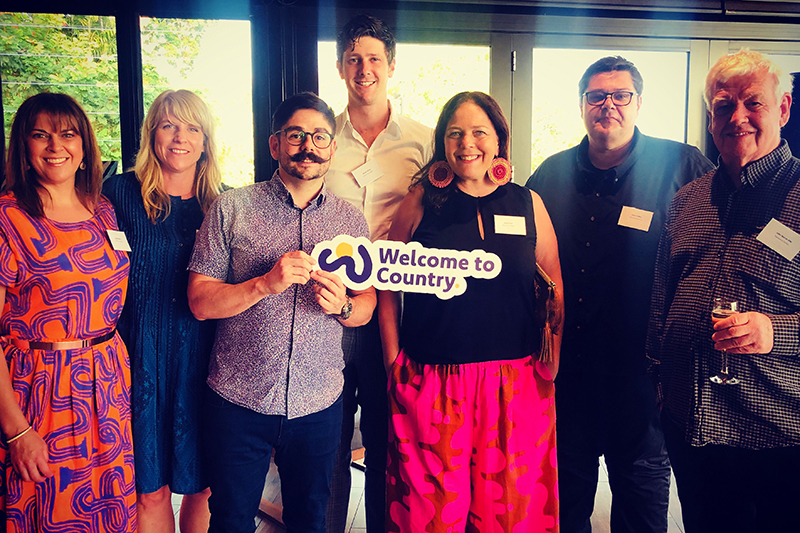How a Traditional Ceremony Inspired Australia’s Fastest Growing Aboriginal Marketplace
ProductPayPal
By Jim Magats, SVP, Payments and SMB Solutions
I recently had the opportunity to speak with Jason Eades, CEO and Board Member of Welcome to Country, an Australia-based startup not-for-profit organization empowering Aboriginal and Torres Strait Islander communities. We spoke with Jason about Welcome to Country, the inspiration behind the not-for-profit’s work how the pandemic created an opportunity to move online, and his advice for aspiring entrepreneurs.
The Aboriginal and Torres Strait Islander communities’ roots run deep, having inhabited Australia and surrounding islands for over 70,000 years. The term “Welcome to Country” refers to a traditional Aboriginal ceremony delivered by an Elder, traditional owner or Aboriginal and Torres Strait Islander person who has been given permission from traditional owners to welcome visitors to their country. Traditionally, it is a ceremony to not only welcome an outsider, but to also grant permission to enter their land, outlines protocols of entry and is an offering of safe passage. This ceremony ultimately served as the inspiration behind Welcome to Country’s name.
The not-for-profit is working to address employment and economic development outcomes in the Aboriginal and Torres Strait Islander communities. I’m inspired by Welcome to Country’s mission and the positive impact of the business, and I hope you appreciate their story as much as I did.

Jim Magats: What inspired the launch of Welcome to Country?
Jason Eades: We started the business to create employment and economic opportunities for First Nations peoples. Originally, the idea was to use technology to help start-up Aboriginal businesses grow and flourish. After a rigorous development, it was agreed that tourism, or as we like to say, “experiences,” were the perfect place to start. We use technology, marketing and other services to grow awareness and demand. We hope that our work leads to many more start-ups in the future and the overall growth of First Nations businesses. It is this original purpose that also led to the expansion of our business to include an online shop for First Nations products.
JM: Can you speak about the Welcome to Country ceremony that inspired the business name?
JE: The term “Welcome to Country” refers to a ceremony that is conducted when one group is seeking to enter or meet with another group. The ceremony traditionally may have lasted for many days, as discussions are held about the purpose of the visit and the appropriate ceremonies are performed. What is significant is the act of gaining permission and agreeing to be respectful while visiting someone’s country. Today, Welcome to Country ceremonies have evolved as a way of acknowledging and paying respect to the Aboriginal and Torres Strait Islander owners of the land. In this spirit, Welcome to Country is about respectful travel to another’s country. The experiences listed on our marketplace are among the best in Australia and provide insights into a rich culture. In return, you are asked to respect the country and its people.
JM: How has the pandemic impacted or changed your business? What did you learn from the pandemic that you’re planning on applying to your business moving forward?

JE: The pandemic hit the tours and experiences side of our business hard, and our Experience Operators were impacted. However, it also delivered new opportunities. We launched an online store for First Nations products that has now become a substantive part of our business and has allowed us to continue to deliver impact. The pandemic taught us that we needed to be agile and open to new opportunities, but also to continue focusing on keeping our customers and operators engaged.
JM: Did PayPal help with your online launch?
JE: When we first launched our online store, we noticed a high number of abandoned carts. We also noticed that peak shopping times were suggesting that people were buying when they were sitting on public transport or had a spare moment. Having a trusted payment solution that was simple and provided customers with confidence that we were a legitimate site were key factors in us deciding to introduce PayPal as a payment method. The impact was immediate, with a huge reduction in abandoned carts. Today, over 40% of purchases on our site are completed through PayPal.
JM: How does Welcome to Country determine criteria for listing products and experiences on the marketplace?
JE: We are guided by our purpose when determining the products and experiences listed in our marketplace. They must help us deliver on creating jobs and economic development outcomes. For experiences, we list Aboriginal, or Torres Strait Islander-owned experiences. We also list non-Indigenous businesses, but only where Aboriginal or Torres Strait Islander people are employed to deliver the tours and experiences. For our retail marketplace, we list items that we directly source from art centers, artists or manufacturers that pay fair royalties. In the case of manufacturers, we rely on advice from the art centers and artists they license designs from to determine if we will stock their products.
JM: What do you hope Welcome To Country can help people better understand about Aboriginal and Torres Strait Islander people and culture?
JE: In life, the one thing that really shifts people's views and builds empathy is the opportunity to meet and connect with others. My hope is that we play a role in connecting people, opening their eyes to an amazing culture and that fellow Australians will gain a newfound respect for and value First Nations culture as much as we do.
JM: As the CEO of Welcome to Country, we know you wear many different hats. Can you share what your typical day looks like?
JE: I don't think there is ever a typical day. In a start-up, you are often rolling up your sleeves and doing whatever is required. Some days, I will be packing boxes alongside our shop staff, other days I’ll be deep in strategic planning for growth, looking for new products to bring to the site or providing insight to small businesses on how retail works. This is what keeps me engaged. You have to be willing to jump in and fix things when needed.
JM: What advice do you have for other entrepreneurs looking to start their own business?
JE: Do your homework. Is your idea really something that consumers need or are looking for? If the answer is yes, and you’re passionate about it, then have a go. Be prepared to be flexible. Finally, surround yourself with people who can help make it happen – people with networks, people who compliment your skills and will help you deliver!